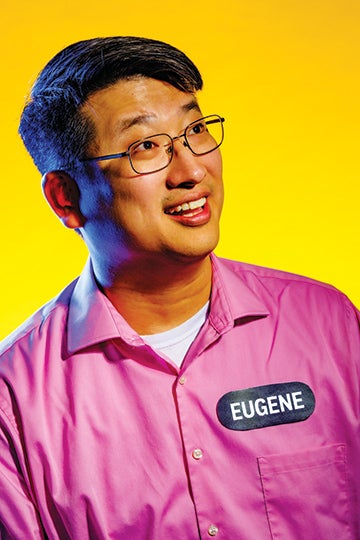Come On Down!
Game show fanatic Eugene Byon finds his voice in the crowd.

Spring 2023
By Laura Furr Mericas
Eugene Byon ’95 says game shows changed his life. The computer programmer has appeared six times on five TV game shows: once each on “Wheel of Fortune,” “The $100,000 Pyramid,” “Let’s Make a Deal” and “The Price Is Right” and twice on “Who Wants To Be a Millionaire?” He has brought home over $40,000 in cash and prizes and is aiming for more.
But what those appearances have helped to bring out in him is more meaningful than the money, Byon admits.
“I was very introverted growing up, and I think there was sort of this more enthusiastic personality that was wanting to come out,” Byon says. “Game shows were a way of making a connection with that part of myself.”
Byon was first introduced to game shows as a young child, watching them almost every day with his mother, who immigrated to the U.S. from Korea before Byon was born. While his mother watched the shows to learn English, Byon recalls being drawn to the energy and the crowds’ fun-loving nature. By the time he was a toddler, he was playing along, encouraging contestants on the screen to “Come on down!”
At the age of 11, Byon moved back to Korea to attend boarding school, followed by studying computer science at Rice and earning a graduate degree from Indiana University Bloomington. During that time, game shows took a back seat to his studies. But in 1998, while Byon was working as a software engineer for Exxon, the fascination was fueled again when “Wheel of Fortune” descended upon Houston for a week of filming. Byon, then 23, knew he had to give it a spin.
[Byon] has appeared six times on five TV game shows: once each on ‘Wheel of Fortune,’ ‘The $100,000 Pyramid,’ ‘Let’s Make a Deal’ and ‘The Price Is Right’ and twice on ‘Who Wants To Be a Millionaire?’
After waiting 15 hours in line and sleeping outside the studios, Byon caught the eyes of producers with his enthusiasm and larger-than-life gestures. His animated spirit carried over to the live taping — laughing madly as he spun the wheel and embracing host Pat Sajak in a giant hug when things didn’t turn out his way. But Byon says that excitement got the best of him that day. In an attempt to rack up more points before solving the puzzle, Byon eventually landed on the “Lose a Turn” space twice and left the show with nothing.
“I was just so enamored with the show that strategy went out the window,” he admits. But now, five game show appearances later, he says he’s found a way to balance his fandom with the facts, applying some of the statistical analysis he’s learned for and in his career.
For Byon, game shows opened up a whole new side of his career at Exxon, where today he’s working as an IT coach. There, he uses his “excessively loud and enthusiastic” personality to help technical teams improve their work practices in fun and productive ways. In one of his most popular presentations, “Big Money: IT Lessons Learned From TV Game Shows,” he likens delivering software to a client to his epic “Wheel of Fortune” loss. Lesson No. 1: “Don’t always go for the big win in one shot. Deliver value early and often instead,” he says.
He’s created games, based on classics like “Family Feud” or Pictionary, for teams too. He says he’s seen countless employees and managers become better teammates after playing a game together — and, perhaps more importantly, laughing together. “I advocate for the use of fun to be able to break down barriers,” he says. For Byon, game shows and business practices are part of the same deal.
